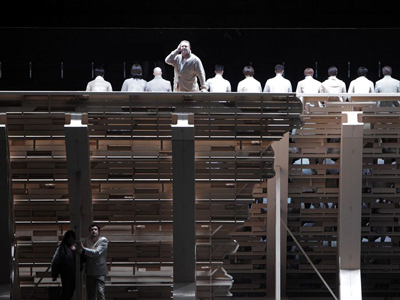By Rebecca Schmid
Richard Wagner has managed to slowly dominate the scene internationally in recent seasons, but with the official arrival of his bicentenary, the saturation in Germany has only begun. Nürnberg, Leipzig, Munich and Dresden have unveiled new exhibits; in the latter’s case, an entire new building. A stream of publications has hit the market, leading Nike Wagner—rebellious daughter of Wieland, one-time bidder for the Bayreuth Festival upon Wolfgang’s resignation—to point her finger at the ‘tsunami-like influx’ (NB: her book Über Wagner comes out February 20). And then there’s the 15-hour opera. Klaus Zehelein, president of the Deutscher Bühnenverein (German Stage Association), called for a moratorium on Ring cycles last June. ‘We should leave the work alone, ideally worldwide,’ he said, denouncing centenary programming as a series of ‘encyclopedic events without artistic relevance.’
In what may be an attempt to provide an antidote, the exhibit, lecture and stage production series Wagner 2013 Künstlerpositionen at Berlin’s Akademie der Künste has set out to grapple with the German master’s polarizing effect and his place in artists’ lives, from painters to contemporary composers. A spokesperson explained that the concept arose from the international enthusiasm for Wagner and was intended to take place prior to this year. Why that didn’t happen is anyone’s guess. On January 27 the academy invited four composers and academy initiates of different generations—Dieter Schnebel, Erhard Grosskopf, Manos Tsangaris, and Enno Poppe—to discuss their relationships to Wagner in the same hall that is exhibiting the legendary rat costumes from Hans Neuenfels’ 2010 production of Lohengrin in Bayreuth.
Musicologist and moderator Jürg Stenzl opened the dialogue with a quote from Pierre Boulez, who declared Wagner ‘forgotten music’ for his generation and invited the composers to express their views on the issue. Schnebel, born in 1930, admitted that he had been corrupted as a child of Nazi times and, upon re-listening to Tristan post-war, couldn’t resist. His Wagner-Idyll (1980), for soprano and chamber orchestra, reworks the lines of Gurnemanz, the veteran knight in Parsifal, into Sprechgesang for a mezzo-soprano—naturally a subversive use of the material. At the other end of the spectrum, Poppe considers Wagner a ‘historical phenomenon,’ much as he considers Nazi Germany part of the past.
None of the composers stated they could ‘believe’ in Wagner. He is too ambiguous, a man who works with symbols, said Schnebel, as opposed to Verdi, whose operas he considers ‘clear cut’ and ‘music of reality.’ This is a fair assessment, although morality is far from clear cut in an opera such as La Traviata (based on the life of the singer Giuseppina Strepponi, whom the composer married). Nor is it true that Verdi didn’t work with symbols—he used entire allegories. The Jewish people in Nabucco represent Italians fighting for liberation from the Hapsburg Empire; the title character of Rigoletto is a disguised king.
Stenzl ended the discussion with a quote from Mauricio Kagel who, upon Beethoven’s centenary, suggested that there be a hiatus from his music for an entire year so that ‘we could then look forward to January 1’ (for a hilarious commentary of the mania around Beethoven, see Kagel’s film Ludwig Van). Tsangaris suggested that, contrary to Cage—who was feted for an entire year at the Akademie der Künste last year—there is already enough interest in Wagner from the public at large (perhaps the academy should have taken up the centenaries of Britten and Lutoslawski instead?). Poppe joked that we will need a ten year break from the Ring because the singers will have to recover their voices.
By many accounts, the music world is already weary. In New York, Robert Lepage’s colossal, machine-generated cycle has provoked a scandal of seemingly irreparable proportions. In Berlin resentment has long been brewing over a tetralogy that the Staatsoper mounted in co-production with La Scala, yielding a light, futuristic aesthetic that one critic likened to a Star Wars film. Meanwhile, in Milan, the decision to open the season with a new Lohengrin by Claus Guth was more than enough to leave national pride wounded in a country where people sing along to the ‘Brindisi’ on New Year’s Day. Still, few can ward off an endless fascination for Wagner, even if it necessitates psychiatric support (as Simon Rattle recently joked in an interview with Die Zeit). For better or for worse, we will be wandering the dark forests of myth for the next year.

